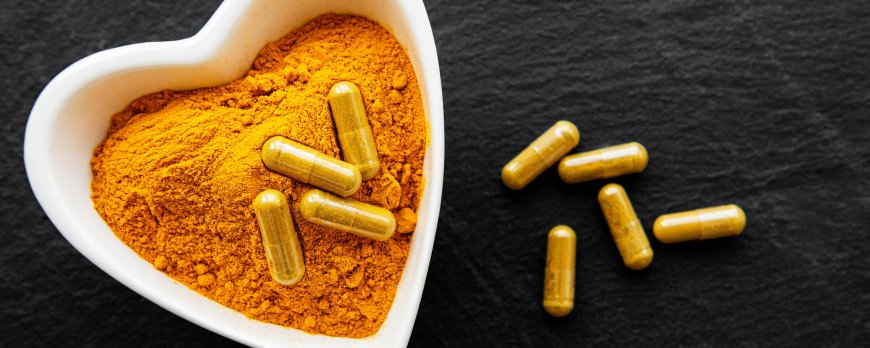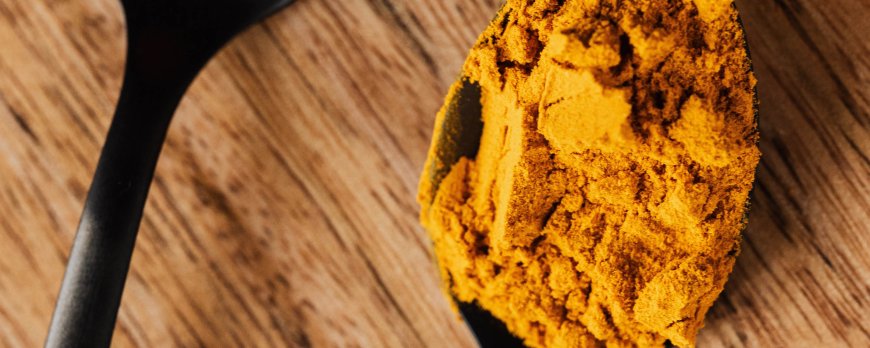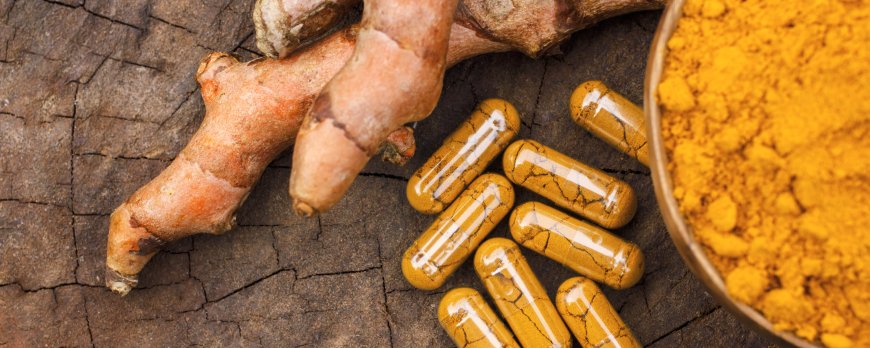Does turmeric lower cholesterol?
Explore the truth behind 'Does turmeric lower cholesterol?' Learn how this vibrant spice may potentially contribute to your heart health regimen.

Does turmeric lower cholesterol?
Turmeric has gained attention for its potential to lower cholesterol levels, but what does the research say?
Key Takeaways:
- Turmeric, specifically its active compound curcumin, has shown potential benefits for lowering cholesterol levels.
- Animal studies have demonstrated that turmeric can reduce LDL cholesterol, total cholesterol, and triglyceride levels.
- There is a lack of large-scale human studies on the effects of turmeric on cholesterol levels, highlighting the need for further research in this area.
- Consulting with a healthcare provider is important before consuming high amounts of turmeric or taking it as a supplement, as it may interact with certain medications and exacerbate certain medical conditions.

The Role of Turmeric in Cholesterol Management
Turmeric has been studied for its potential to impact cholesterol levels, and it may offer a natural remedy for those with high cholesterol. The active compound in turmeric, curcumin, has shown promise in lowering LDL cholesterol levels and preventing its oxidation. Research has also indicated that turmeric can reduce total cholesterol and triglyceride levels, making it a potentially beneficial addition to a cholesterol management plan.
In animal studies, turmeric has consistently demonstrated positive effects on cholesterol levels. It has been observed to decrease LDL cholesterol, which is often referred to as "bad" cholesterol, and improve overall lipid profiles. These findings suggest that turmeric may help to regulate cholesterol levels and promote heart health.
However, it is important to note that there is currently a lack of large-scale human studies investigating the effects of turmeric on cholesterol levels. While animal studies provide valuable insights, further research is needed to determine the optimal dosage and potential benefits of turmeric for cholesterol reduction in humans.
Before incorporating turmeric into your cholesterol management regimen, it is advisable to consult with a healthcare provider. They can provide guidance on the appropriate dosage and potential interactions with medications or existing medical conditions. It is important to approach turmeric as a natural remedy with caution and ensure it aligns with your specific health needs.

The Science Behind Turmeric's Cholesterol-Lowering Properties
The scientific research on turmeric's impact on LDL and HDL cholesterol levels provides insights into its potential as a cholesterol-lowering agent. Turmeric contains an active compound called curcumin, which has been found to have various health benefits, including reducing LDL cholesterol levels.
Studies have shown that curcumin can inhibit the production of LDL cholesterol in the liver, thereby reducing its levels in the bloodstream. Additionally, curcumin has been found to prevent the oxidation of LDL cholesterol, which is a key step in the development of plaque buildup in the arteries.
Furthermore, some research suggests that turmeric may have a positive effect on HDL cholesterol, often referred to as "good" cholesterol. HDL cholesterol helps remove LDL cholesterol from the bloodstream, preventing it from accumulating in the arteries.
The Potential Benefits of Turmeric for Cholesterol Management:
- Reduces LDL cholesterol levels
- Prevents oxidation of LDL cholesterol
- Possibly increases HDL cholesterol levels
It is important to note that while these findings are promising, they are primarily based on animal studies and small-scale human trials. Large-scale human studies are necessary to further understand the dosage and effects of turmeric on cholesterol levels in humans.
Moreover, it is crucial to consult with a healthcare provider before significantly increasing turmeric consumption or taking turmeric supplements, especially if you are on medications or have underlying medical conditions. Turmeric supplements may interact with certain medications and could potentially worsen existing health conditions.
In conclusion, the scientific evidence suggests that turmeric, particularly its active compound curcumin, may have cholesterol-lowering properties. However, more research is needed to fully understand its effectiveness, optimal dosage, and potential interactions. Incorporating turmeric into a heart-healthy lifestyle, including a balanced diet and regular exercise, may be beneficial for cholesterol management, but it is always best to consult with a healthcare professional for personalized advice.

Animal studies on turmeric and cholesterol reduction
Animal studies have provided promising insight into the cholesterol-lowering effects of turmeric, showing reductions in LDL cholesterol, total cholesterol, and triglyceride levels. These studies have demonstrated that the active compound in turmeric, curcumin, can effectively lower LDL cholesterol levels and prevent its oxidation, which is a key contributor to cardiovascular disease.
In these studies, animals supplemented with turmeric exhibited significant decreases in both LDL cholesterol and total cholesterol levels. Furthermore, turmeric was found to reduce triglyceride levels, another important marker of heart health. These findings suggest that turmeric has the potential to be a valuable natural remedy for managing cholesterol levels.
The role of curcumin in cholesterol reduction
The cholesterol-lowering effects of turmeric can be attributed to its active compound, curcumin. Curcumin has been found to modulate various enzymes and pathways involved in cholesterol metabolism, leading to a decrease in LDL cholesterol synthesis and an increase in its clearance from the body. Additionally, curcumin has antioxidant properties that help protect against the oxidation of LDL cholesterol, which can contribute to the development of atherosclerosis.
While animal studies provide valuable insights into the potential benefits of turmeric for cholesterol reduction, it is important to note that further research is needed to determine the optimal dosage and potential benefits for humans. Additionally, it is crucial to consult with a healthcare provider before consuming high amounts of turmeric or taking it as a supplement, as it may interact with certain medications and exacerbate certain medical conditions.
In conclusion, animal studies have shown promising results regarding the cholesterol-lowering effects of turmeric. The active compound curcumin has been found to reduce LDL cholesterol levels, prevent its oxidation, and lower total cholesterol and triglyceride levels in animals. However, more research is necessary to determine the precise dosage and potential benefits for humans. It is important to exercise caution and seek professional advice before incorporating turmeric into your cholesterol management regimen.

Lack of Large-Scale Human Studies
Despite promising animal studies, there is still a lack of large-scale human studies on the effects of turmeric on cholesterol levels. While research in animals has shown that turmeric can reduce LDL cholesterol, total cholesterol, and triglyceride levels, it is important to note that these findings may not directly translate to humans.
Human studies are essential to determine the optimal dosage and potential benefits of turmeric for cholesterol reduction in humans. The limited number of human studies conducted so far have yielded mixed results, with some suggesting a positive influence on cholesterol levels, while others show no significant impact.
Given the lack of large-scale human studies, it is crucial to approach turmeric as a potential natural remedy for cholesterol management with caution. Consulting with a healthcare provider is recommended before incorporating high amounts of turmeric into your diet or considering turmeric supplements, especially if you are taking medications or have underlying medical conditions that may interact negatively with turmeric.
While the available evidence indicates the potential benefits of turmeric for cholesterol management, further research is needed to establish a clearer understanding of its effectiveness in humans. Until more robust scientific studies are available, it is advisable to combine turmeric with other proven lifestyle changes, such as a healthy diet and regular exercise, to maintain optimal heart health.
Potential Interactions and Considerations
It is important to be aware of potential interactions and considerations when using turmeric for cholesterol management. While turmeric has shown promise in reducing cholesterol levels, it is essential to consult with a healthcare provider before consuming high amounts of turmeric or taking it as a supplement, especially if you are currently taking any medications or have pre-existing medical conditions.
Some medications may interact with turmeric, including blood thinners like warfarin or antiplatelet drugs like clopidogrel. Turmeric may enhance the effect of these medications, potentially leading to bleeding or bruising. Additionally, turmeric may interact with drugs that are metabolized by the liver, such as certain statins or anticoagulants.
If you have gallbladder problems or are prone to kidney stones, it is important to exercise caution when using turmeric as it may exacerbate these conditions. Turmeric can increase bile production, which may worsen symptoms in individuals with gallbladder issues. Furthermore, turmeric contains oxalates, which can contribute to the formation of kidney stones in susceptible individuals.
When incorporating turmeric into your cholesterol management regimen, it is best to start with small amounts and monitor your body's response. This allows you to identify any potential side effects or adverse reactions. If you experience any unusual symptoms, such as digestive upset or allergic reactions, discontinue use and consult with a healthcare professional.

Exploring turmeric as part of a heart health regimen
Turmeric can be a valuable addition to a heart health regimen when combined with other lifestyle changes. This vibrant yellow spice, commonly used in Eastern Asian and Middle Eastern cuisine, has shown potential benefits for reducing cholesterol levels. The active compound in turmeric, known as curcumin, has been found to lower LDL cholesterol levels and prevent its oxidation.
When it comes to managing cholesterol, incorporating turmeric into your diet may offer some advantages. While there is still a need for larger-scale human studies, animal studies have shown promising results. Turmeric has been found to reduce LDL cholesterol, total cholesterol, and triglyceride levels in these studies.
However, it is important to note that the optimal dosage and specific effects of turmeric on cholesterol levels in humans are still being explored. Consultation with a healthcare provider is recommended, especially if considering consuming high amounts of turmeric or taking it as a supplement. This is important as turmeric may interact with certain medications and exacerbate existing medical conditions.
In conclusion, while further research is needed, turmeric can be a valuable addition to a heart health regimen when combined with other lifestyle changes such as a healthy diet and regular exercise. It is important to approach turmeric with caution, consulting with a healthcare provider to ensure it is suitable for your individual circumstances.
Turmeric Supplements for Cholesterol Management
Turmeric supplements can be a convenient option for those seeking to incorporate turmeric into their cholesterol management routine. These supplements are typically made from the active compound in turmeric, curcumin, which has been found to have potential benefits for lowering cholesterol levels.
When choosing a turmeric supplement, it is important to look for a high-quality product that contains a standardized amount of curcumin. This ensures that you are getting a consistent dose of the active compound. Additionally, some supplements may also contain other ingredients that aid in the absorption of curcumin, such as black pepper extract.
Benefits of Turmeric Supplements for Cholesterol Management
- LDL Cholesterol Reduction: Research has shown that curcumin can lower levels of LDL cholesterol, commonly referred to as "bad" cholesterol. By reducing LDL cholesterol, turmeric supplements may help to improve overall cholesterol balance.
- Antioxidant Properties: Curcumin has antioxidant properties, which can help to prevent the oxidation of LDL cholesterol. When LDL cholesterol becomes oxidized, it is more likely to contribute to the development of plaque in the arteries.
- Inflammation Reduction: Turmeric has been used for centuries in traditional medicine for its anti-inflammatory properties. Chronic inflammation is believed to play a role in the development of heart disease, so reducing inflammation may be beneficial for cholesterol management.
While turmeric supplements can be a convenient way to incorporate turmeric into your cholesterol management routine, it is important to use them as a supplement to a healthy lifestyle. A balanced diet, regular exercise, and other heart-healthy habits should also be part of your overall approach to managing cholesterol levels. It is always recommended to consult with a healthcare provider before starting any new supplement regimen, especially if you have underlying health conditions or are taking medications.

The dosage and effect of turmeric on cholesterol levels in humans
The dosage and effect of turmeric on cholesterol levels in humans are still being explored to determine the most effective use. While there is promising evidence from animal studies and limited human trials, larger-scale research is needed to confirm its benefits.
Current studies suggest that consuming turmeric as part of a healthy diet may help lower LDL cholesterol levels, also known as "bad" cholesterol. This is attributed to the active compound curcumin, which has antioxidant and anti-inflammatory properties. Curcumin has been found to inhibit the production of cholesterol in the liver and reduce the oxidation of LDL cholesterol, which can help prevent the formation of plaque in the arteries.
However, it is essential to note that individual responses to turmeric may vary. The dosage required to achieve cholesterol-lowering effects is still uncertain, and it may depend on factors such as an individual's overall health, diet, and genetic predisposition. Consulting with a healthcare provider is crucial before incorporating turmeric into your cholesterol management regimen, especially if you have existing medical conditions or are taking medications.
Considerations when using turmeric for cholesterol management:
- Discuss with your healthcare provider before consuming large amounts of turmeric or taking turmeric supplements
- Avoid exceeding recommended dosages, as high amounts of turmeric may interact with certain medications
- Monitor your cholesterol levels regularly and consult with your healthcare provider to evaluate the effectiveness of turmeric in your specific case
- Take into account potential interactions with other supplements or medical conditions you may have
To fully understand the dosage and effect of turmeric on cholesterol levels in humans, additional well-designed studies are needed. While turmeric shows promise as a natural remedy for cholesterol management, further research will help determine its optimal use and potential benefits for individuals aiming to lower their cholesterol levels.
Benefits and Limitations of Turmeric for Cholesterol Management
Using turmeric for cholesterol management may offer benefits, but it is important to consider the limitations of the current research. With its active compound, curcumin, turmeric has shown potential in lowering LDL cholesterol levels and preventing its oxidation. This spice has been used in traditional medicine for centuries and animal studies have supported its cholesterol-lowering effects on LDL cholesterol, total cholesterol, and triglyceride levels.
However, it is important to note that there is a lack of large-scale human studies on the specific effects of turmeric on cholesterol levels. While animal studies are promising, more research is needed to determine the optimal dosage and potential benefits of turmeric for cholesterol reduction in humans. The science behind turmeric's cholesterol-lowering properties is still being explored, and it is crucial to consult with a healthcare provider before consuming high amounts of turmeric or taking it as a supplement.
Potential Interactions and Considerations
- Turmeric may interact with certain medications and exacerbate certain medical conditions, so it is important to consult with a healthcare provider before using it for cholesterol management.
- The dosage and effect of turmeric on cholesterol levels in humans are still being researched, and individual responses may vary.
- It is essential to choose high-quality turmeric supplements, as the purity and potency may vary among different products in the market.
Incorporating turmeric into a heart health regimen, alongside other lifestyle changes like a healthy diet and regular exercise, may provide additional benefits for cholesterol reduction. While turmeric shows promise, it is crucial to consider the limitations of the current research and continue to explore its potential in managing cholesterol levels. More large-scale human studies are needed to fully understand the effects and benefits of turmeric on cholesterol in the general population.
Conclusion
Turmeric shows promise in potentially lowering cholesterol levels, although more research is needed to fully understand its effects. The active compound in turmeric, curcumin, has been found to lower LDL cholesterol levels and prevent its oxidation. Animal studies have shown that turmeric can reduce LDL cholesterol, total cholesterol, and triglyceride levels. However, it is important to note that there is a lack of large-scale human studies on turmeric's effects on cholesterol levels.
While the science behind turmeric's cholesterol-lowering properties is promising, it is essential to consult with a healthcare provider before consuming high amounts of turmeric or taking it as a supplement. This is because turmeric may interact with certain medications and exacerbate certain medical conditions. It is always best to seek professional advice to ensure turmeric is safe and appropriate for individual health circumstances.
In conclusion, turmeric shows potential in managing cholesterol levels, particularly in reducing LDL cholesterol. Incorporating turmeric into a heart health regimen, alongside other lifestyle changes such as a healthy diet and regular exercise, may be beneficial. However, further research is needed to determine the optimal dosage and potential benefits of turmeric for cholesterol reduction in humans. As the scientific community continues to explore the effects of turmeric on cholesterol, it is advisable to stay informed and consult with healthcare professionals for personalized advice.
FAQ
Does turmeric lower cholesterol?
Turmeric has been shown to have the potential to lower cholesterol levels. The active compound in turmeric, curcumin, has been found to lower LDL cholesterol levels and prevent its oxidation.
What are the potential benefits of turmeric for cholesterol?
Turmeric can potentially help lower LDL cholesterol, total cholesterol, and triglyceride levels. However, it is important to note that there is a lack of large-scale human studies to fully determine the effects of turmeric on cholesterol levels.
Are there any precautions to take when using turmeric for cholesterol management?
It is important to consult with a healthcare provider before consuming high amounts of turmeric or taking it as a supplement. Turmeric may interact with certain medications and exacerbate certain medical conditions.
What is the role of turmeric in cholesterol management?
Turmeric may have a potential role in managing cholesterol levels. It can impact LDL cholesterol levels and may be considered as a natural remedy for high cholesterol. However, more research is needed to fully understand its effects.
What does the science say about turmeric's cholesterol-lowering properties?
Scientific evidence supports the cholesterol-lowering properties of turmeric. It can affect LDL cholesterol levels and potentially have an impact on HDL cholesterol, also known as "good" cholesterol.
What have animal studies shown about turmeric and cholesterol reduction?
Animal studies have shown that turmeric has the potential to reduce LDL cholesterol, total cholesterol, and triglyceride levels. These findings suggest the benefits of turmeric in cholesterol management.
Why is there a lack of large-scale human studies on turmeric's effects on cholesterol?
Currently, there is a lack of large-scale human studies on turmeric's effects on cholesterol levels. More research is needed to determine the dosage and potential benefits of turmeric for cholesterol reduction in humans.
Are there any potential interactions or considerations when using turmeric for cholesterol management?
Yes, it is important to consult with a healthcare provider before consuming high amounts of turmeric or taking it as a supplement. Turmeric may interact with certain medications and exacerbate certain medical conditions.
How can turmeric be incorporated into a heart health regimen?
Turmeric can be incorporated into a heart health regimen along with other lifestyle changes, such as a healthy diet and regular exercise. It may have potential benefits for cholesterol reduction when used in combination with these measures.
Are turmeric supplements effective for cholesterol management?
Turmeric supplements may be used for cholesterol management. However, it is important to choose a high-quality product and consult with a healthcare provider before starting any supplementation regimen.
What is the recommended dosage of turmeric for cholesterol reduction?
The optimal dosage of turmeric for cholesterol reduction in humans is still being explored. More research is needed to determine the appropriate dosage and potential benefits.
What are the benefits and limitations of using turmeric for cholesterol management?
The benefits of turmeric include potential reductions in LDL cholesterol levels. However, limitations include the lack of large-scale human studies and the need for further research to determine its full effects on cholesterol levels.


































































































































